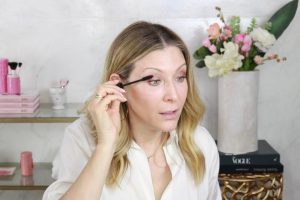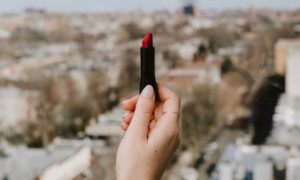If there’s a transformative step in your skincare routine, it’s exfoliation — a.k.a. the act of buffing away or dissolving the glue that holds dead skin cells together. In fact, it’s a game-changer for any skin type and concern. “Getting rid of dead skin cells does a lot for the health of your skin,” says NakedPoppy research scientist Marisa Plescia. “By removing the excess dead skin cell buildup, you stimulate cell turnover and new skin cells, resulting in skin that’s renewed, smoother, and healthier.”
But, as with so many things in life, it’s possible to have too much of a good thing. And if you exfoliate too frequently or with formulas that are too powerful for your skin type, that can inadvertently lead to over-exfoliation. It’s the Pandora’s Box of skin health, leading to redness, discomfort, and other signs of inflammation — and, of course, best avoided at all costs.
With that in mind, here’s how to know when you’ve over-exfoliated, and how you can restore your skin back to its most radiant and smooth.
What is over-exfoliation?
The reason over-exfoliation is so harmful? “Simply put, over-exfoliation is causing damage to your skin barrier,” Plescia explains. “The skin’s surface is naturally protected by the oils, the dead skin cells, and the microbiome to help seal in moisture and keep potential irritants out. When these protective properties are stripped away with excessive exfoliation, the result is a weakened skin barrier.” And you know what happens with a damaged skin barrier, right? (Right!) Think: Breakouts, redness, dryness, and an all-around skin meltdown.
So, quick question: Why even exfoliate to that point? It’s more common — and tempting — to do so than you might think. NakedPoppy skin specialist Tara Parenti has found that people “love that squeaky-clean feeling, whether that be after cleansing or exfoliation,” she says. “What they don’t realize is that is an indication of dehydration, and that their skin is being stripped of water and potentially lipids.” She’s also found that people tend to think stinging or burning sensations means that it’s working. And while some products can and are intended to create mild tingling or itching, “burning doesn’t mean it’s working — burning means you are damaging your skin,” she says.
What happens if you over-exfoliate?
The biggest over-exfoliation signs are those that indicate a damaged skin barrier — like irritation, redness, and sensitivity, says Plescia. You might also feel it, with breakouts and textured skin, or a tight, uncomfortable feeling.
You may also notice a difference elsewhere in your routine — for instance, if your skin burns when you apply your normal skincare products. “For example, vitamin C, being acidic, will most likely cause discomfort and even redness on over-exfoliated skin,” Parenti says.
Last but not least: Can over-exfoliation permanently damage skin? It’s not out of the question. Over time, “over-exfoliated skin can lead to more persistent inflammatory skin conditions like, for example, dermatitis,” she says.
The best over-exfoliation treatment strategy
If you think you might have gone overboard with exfoliation, first: You’re not alone. It can be tempting to think more is better. And if you’re totally stuck, we can help; just take our easy, 3-minute beauty assessment, which will account for the state of your skin and give you personalized recs to keep it healthy and happy. With that in mind, scroll ahead for three key tweaks to make if you’re feeling more red than radiant.
Audit your routine
First, walk through your routine with an eye out for various exfoliants. “Over-exfoliating with alpha or beta hydroxy acids is the easiest and most common way to over-exfoliate the skin, in part because sometimes people use acids in nearly every step of their skincare routine — oftentimes without knowing it,” says Parenti. For example, face creams will sometimes contain enzymes, while your cleanser may have salicylic acid. While that may be fine for some, doubling up could lead to or exacerbate over-exfoliation.
Baby your barrier
Once you have an inventory of exfoliating products in your routine — whether they’re billed as such or not — stop using them. “Given that over-exfoliation results in a damaged barrier function, I would recommend discontinuing it until your skin health is restored to a more balanced state,” says Parenti, who suggests moisturizing instead. By supplementing your skin barrier with the components it lost via exfoliation — such as humectants and emollients — you can restore it back to health.
Slather on sunscreen
Whether you’re actively exfoliating or giving it a break, sunscreen is still in order — and lots of it. “The sun and UV radiation can make any inflammation, irritation, and redness worse,” says Plescia. That won’t help matters if you’re already dealing with over-exfoliated skin. Plus, once you do reincorporate exfoliation — more on that in a sec — it’s still an essential, since alpha hydroxy acids can leave skin more sensitive to sunlight.
How long does it take for over-exfoliated skin to go back to normal?
For starters, you’ll be in the clear once “your skin is no longer experiencing symptoms of a compromised barrier function,” Parenti says. In other words, once redness and flakes subside, skin no longer feels rough or bumpy, or you’re not dealing with any sudden breakouts, you can consider your over-exfoliation over.
However, don’t just dive back into your standard skincare routine. Instead, “slowly introduce exfoliation one day a week — and gradually build up to the recommended maximum usage only if your skin can tolerate that,” she says. (It should go without saying that you should only start with one exfoliant total, too, in case you found that you were using multiples throughout your routine.)
Bottom line? Exfoliation is a great, powerful skincare step, and one you should definitely be doing if you have the time and energy. It’s all a matter of doing it in a way that respects your skin barrier — offering you, in the long run, the best of both worlds.






Comments